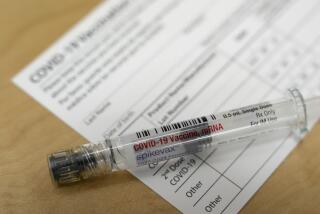The smallpox dilemma
Thirty years have gone by since every child born in the United States got a routine smallpox vaccination. We didn’t think much about the vaccine back then, and we haven’t had to worry about it since.
That could change. Officials at the federal Centers for Disease Control and Prevention announced earlier this month that they favor a plan that would make the vaccine available to the general public. The Bush administration has not made a decision about public access to the vaccine; for now, officials are focused more on how to get it to front-line emergency workers.
But sooner or later each of us probably will have to weigh the threat of a smallpox attack by terrorists against the threat posed by the vaccine itself.
It’s going to be a tough call in many families. For as the threat of terror has grown, so has the risk of side effects. In the years since routine vaccination, we have not only developed new diseases, such as AIDS, but new drugs, such as cancer-fighting agents, that suppress the immune system and put millions more at risk of dangerous vaccine side effects. The smallpox vaccine contains a live virus, called vaccinia. This virus does not cause human smallpox. But during the 1960s it spread out of control in about 900 of every 1 million people, causing rashes, fever and body aches, researchers estimate. About a dozen of these people developed encephalitis or other potentially deadly afflictions, and one or two died.
To some, the choice is obvious. “If some attack happened, you’d be protected,” said Fernando Derosa, 33, of Hayward, who volunteered to receive the vaccine in a clinical trial at Kaiser Permanente in Oakland. Derosa said the risks of vaccination pale beside the threat of terror: Smallpox kills about one in three people it infects.
The more than 100 million Americans who got the vaccine as children also are far less likely to suffer side effects than those who have not been inoculated, researchers said.
But the equation is more complex for millions of Americans with weakened immune systems. These people may run more than 10 times the one-in-150,000 odds for serious side effects calculated from the 1960s campaign. And they can catch the vaccinia virus merely by coming into close contact with someone who has been recently vaccinated. “This creates a household risk,” said Dr. Joel Ward, director of vaccine research at Harbor-UCLA Research ad Education Institute in Torrance. “If you get immunized and are living with someone on chemotherapy, for example, you could spread the virus to that person.” Family members who want the vaccination will have to weigh the risk to their loved ones.
For such reasons, government officials have been very cautious when advising the public about vaccination. “If there’s no attack, there’s no reason to put yourself at risk of the complications of the vaccine,” said Dr. Anthony Fauci, director of the National Institute of Allergy and Infectious Diseases, “especially if you’re someone with a weakened immune system.”
The same goes for those suffering from eczema, the recurring outbreaks of itchy, dry, inflamed skin that affect up to 10% to 20% of people. For reasons no one understands, the prevalence of eczema has doubled or tripled since the era of routine smallpox vaccination, according to Dr. Donald Leung of the National Jewish Medical and Research Center in Denver. When exposed to the vaccine, these men, women and children are at increased risk of eczema vaccinatum, which can cause fever, sores, deep scarring--and, in 1% to 6% of cases, death.
In the months ahead, we’re likely to hear a lot about these complications. The American public is far more wary of vaccines than it was 30 years ago. The National Vaccine Information Center, an advocacy group founded in 1982, is made up of many parents who attribute their children’s illnesses and mental disorders to vaccinations. The group has come out strongly against releasing the smallpox vaccine to the public. “I would advise parents to talk to their doctor, get on the Internet and just learn as much as they can about this before exposing their kids,” said Barbara Loe Fisher, the group’s president and co-founder.
In the event of an attack and possible exposure all of these cautions go out the window, doctors said. “The risk of dying from smallpox trumps any risk there might be from the vaccine, certainly in healthy people but also in immuno-suppressed people,” Fauci said.






